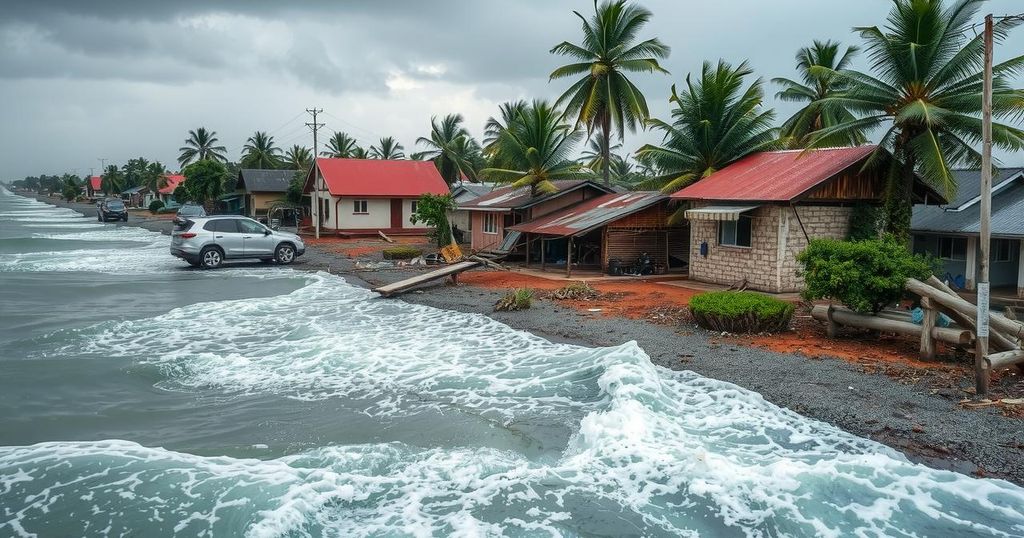Tropical Cyclone Chido Impacts Southern Africa: Preparedness and Response Measures Initiated

Tropical Cyclone Chido has struck Mayotte and the Comoros, with significant rainfall and winds threatening millions in Southern Africa. While Madagascar has reported no damage, assessments continue. Chido is expected to land in Mozambique, prompting emergency responses to prepare for flooding and strong winds, with various nations issuing advisories and mobilizing resources.
As of 14 December, Tropical Cyclone Chido has impacted regions of Mayotte and the Comoros, bringing severe winds and heavy rainfall that threaten to cause flooding and mudslides in southern Africa. Approximately 2.5 million individuals are within Chido’s projected trajectory, with significant populations in Mozambique, Malawi, and the Comoros. On 13 December, Chido affected the northern part of Madagascar, although no significant damage or casualties have been reported, prompting the lifting of cyclone warnings along its northwest coast. Despite this, local authorities continue to assess the cyclone’s impact, as weather conditions remain unsettled.
Regional authorities are actively engaging in preparedness efforts and conducting assessments of losses and damages caused by the cyclone. As Chido moves further westward, it is expected to make landfall in northern Mozambique on 15 December, exacerbating the risk of flooding and dangerous maritime conditions. The storm has already caused destruction in the Comoros, with reports of damaged homes and disrupted livelihoods. Furthermore, heavy rainfall is anticipated across Mozambique and potential flash floods in neighboring countries, including Malawi and Zimbabwe, as remnants of the cyclone dissipate in the region.
Initially forming as a depression in early December, Cyclone Chido intensified into a Category 4 cyclone, later weakening to Category 3 before approaching Madagascar. Emergency response teams are mobilizing to provide aid and resources across impactful areas, with advisories issued nationally in affected nations. Preparations include prepositioning relief supplies and activating emergency response centers to ensure rapid response capabilities. Every country involved is coordinating with humanitarian partners to assess needs and implement protective measures for vulnerable populations.
While the wind and rain patterns of Cyclone Chido pose significant risks, affected authorities are maintaining vigilance and continuously updating emergency procedures. The collaborative efforts across the region aim to mitigate the cyclone’s impact and provide timely assistance to those most at risk. The situation remains under scrutiny as Chido progresses towards Mozambique and beyond, warranting ongoing weather monitoring and community awareness efforts to ensure public safety.
Tropical Cyclone Chido has emerged as a significant weather event in the region, affecting Southern Africa with heavy rains and strong winds, leading to major flooding risks. The cyclone impacts densely populated areas including Mozambique, where over 1.7 million residents face threats from high winds and rainfall. Countermeasures and emergency response plans have been activated to address any potential crises that may arise from the cyclone, especially as Chido approaches coastal regions and subsequently moves inland. Countries such as Mozambique, Malawi, and the Comoros are coordinating their disaster management responses to provide timely aid and update public advisories as necessary.
In summary, Tropical Cyclone Chido is posing severe risks to millions across Southern Africa, with significant impacts already noted in Mayotte and the Comoros. As it approaches Mozambique, authorities are ramping up emergency responses and preparing for potential flooding and destruction. The collaborative efforts among regional and national agencies are crucial in ensuring that adequate response mechanisms are in place to support affected populations and minimize the cyclone’s adverse effects. Continuous monitoring of the cyclone’s progress alongside public awareness campaigns will be essential to safeguard communities in the projected path of Chido.
Original Source: allafrica.com







